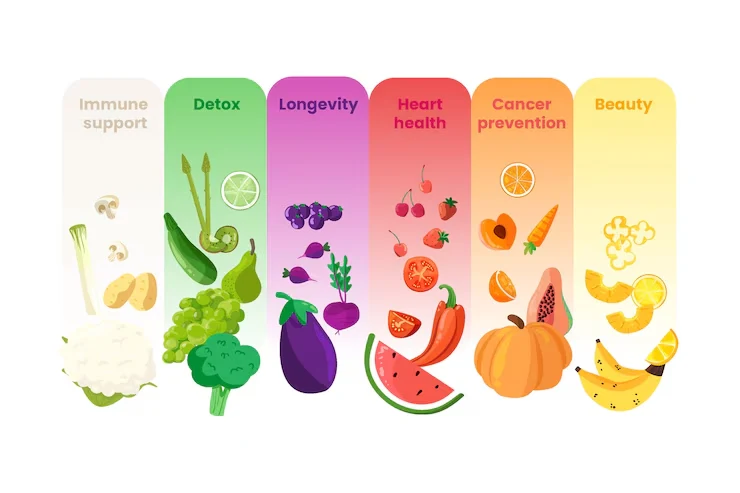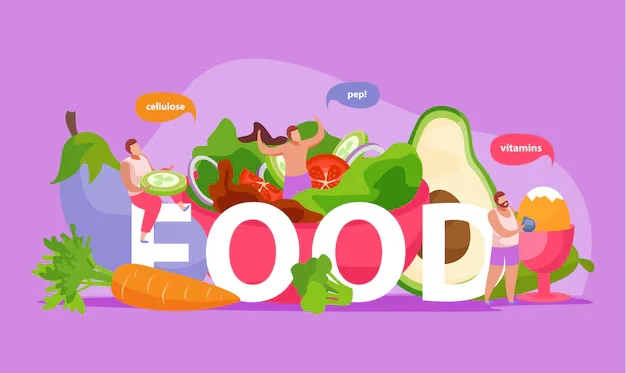People talk a lot about superfoods because they are full of healthy nutrients like vitamins, minerals, and antioxidants. These foods can help your body stay strong, give you energy, and protect you from getting sick. But sometimes, people believe things about superfoods that are not true.
For example, some say one food can cure all sickness—that is not right. While superfoods are good for your health, they are not magic. It is important to know the facts and not believe every story we hear. This way, we can make smart choices about what we eat and stay healthy.
What Makes a Food Super?
Superfoods are special foods that are really good for your body. In this, different healthy foods are mixed to make it better.
- Vitamins – help you stay healthy and strong
- Minerals – help your body work right
- Antioxidants – help protect you from getting sick
- Fiber – helps your stomach feel good and keeps you regular
They can also help you:
- Stay healthy and feel good
- Keep you safe from some sicknesses
- Help your brain work well
- Make your skin and hair healthy
Some examples of superfoods are fruits like berries, green veggies like spinach, fish, seeds, and nuts. Eating a mix of these foods every day can help your body stay strong and happy!

Superfoods for Your Overall Health
Superfoods for Healthy Skin
Fact: Some foods are very good for your skin, and it really works.
- Avocados: Avocados have healthy fats and vitamin E, which help keep your skin soft and smooth.
- Tomatoes: Tomatoes help protect your skin from the sun and keep it looking young.
- Green Tea: Green tea helps reduce redness and protects your skin from damage.
- Walnuts: Walnuts have nutrients that help keep your skin healthy and hydrated.
Fiction: Eating just tomatoes or avocados would not magically give you perfect skin. Healthy skin also needs water and good care.
Superfoods for Healthy Hair
Fact: The food you eat can help your hair grow strong.
- Salmon: Salmon has healthy fats that help your hair grow and stay strong.
- Spinach: Spinach has iron, which helps keep your scalp healthy and your hair growing.
- Eggs: Eggs have protein and biotin, which are both good for your hair.
- Sweet Potatoes: Sweet potatoes have vitamin A, which helps your scalp stay healthy.
Fiction: Eating these foods would not fix hair loss. Your hair health depends on many things, including genetics and how well you take care of it.
Superfoods for Healthy Lungs

Fact: Some foods help keep your lungs healthy.
- Apples: Apples are good for your lungs because they are full of antioxidants that protect your body.
- Garlic: Garlic can help reduce swelling in your lungs and keep them healthy.
- Berries: Berries are full of vitamins and protect your lungs from damage.
- Turmeric: Turmeric has a special ingredient that helps reduce swelling, which is good for your lungs.
Fiction: No food can cure lung diseases. A healthy lifestyle is also needed to keep your lungs in good shape.
Superfoods for Healthy Liver
Fact: Your liver loves healthy foods. If you eat healthy you will live more than others.
- Beetroot: Beetroot helps your liver clean out harmful things in your body.
- Lemons: Lemons are full of vitamin C, which helps your liver do its job better.
- Garlic: Garlic helps your liver by making it easier to get rid of toxins.
- Leafy Greens: Greens like spinach help your liver stay healthy by removing toxins from your body.
Fiction: No special food can detox your liver by itself. Your liver is great at cleaning your body if you take care of it by eating healthy and staying hydrated.
Superfoods for Healthy Eyes
Fact: Eating certain foods can keep your eyes strong.
- Carrots: Carrots are good for your eyes because they have vitamin A, which helps you see better, especially at night.
- Spinach: Spinach has special nutrients that help protect your eyes as you get older.
- Eggs: Eggs help your eyes by providing zinc, which keeps your vision healthy.
- Oranges: Oranges are full of vitamin C, which helps keep your eyes healthy and strong.
Fiction: Carrots would not fix poor vision. It is important to get regular check-ups and take care of your eyes.
Superfoods for Healing
Fact: Eating healthy foods can help your body heal.
- Chicken Soup: Chicken soup is soothing and helps your body get better when you’re sick.
- Ginger: Ginger can help reduce swelling and make you feel better if you’re feeling sick.
- Yogurt: Yogurt is full of healthy bacteria that helps your stomach and keeps you healthy.
- Citrus Fruits: Fruits like oranges are full of vitamin C, which helps your body heal and stay strong.
Fiction: No food can replace going to the doctor. Healthy foods help your body heal, but they do not cure everything by themselves.
Superfoods for Healthy Sperm
Fact: Foods can affect how healthy sperm is.
- Walnuts: Walnuts are good for sperm health because they have healthy fats.
- Tomatoes: Tomatoes are full of nutrients that can help sperm move and grow stronger.
- Spinach: Spinach has folate, which is important for healthy sperm.
- Eggs: Eggs provide important nutrients for sperm health.
Fiction: No one food can guarantee fertility. Eating a balanced diet, getting exercise, and living a healthy life are all important for reproductive health.
Benefits of Superfoods

- Help You Grow Strong – Superfoods like spinach, eggs, and fish have special things inside them (like vitamins and protein) that help your bones and muscles grow big and strong.
- Stop You from Getting Sick – Oranges and garlic are superfoods that help your body fight off colds and other germs, so you don’t get sick as much.
- Make Your Brain Work Better – Blueberries and nuts help your brain think clearly, remember things, and do better in school.
- Keep Your Skin and Hair Healthy – Foods like avocados and walnuts help your skin stay soft and clean, and they make your hair shiny and strong.
- Give You Energy to Play and Learn – Superfoods like oats and sweet potatoes give you lots of energy so you can run, play, and pay attention in class all day.
Eating superfoods every day helps you stay healthy, smart, and full of energy!
Conclusion
Superfoods can definitely help keep us healthy, but they are not magic. Eating a variety of healthy foods, drinking lots of water, and getting enough sleep are all important for your health. No food can make you super healthy all on its own. It’s about taking care of your body in many ways. So, make sure to eat a mix of superfoods, stay active, and listen to your doctor to stay in top shape.



